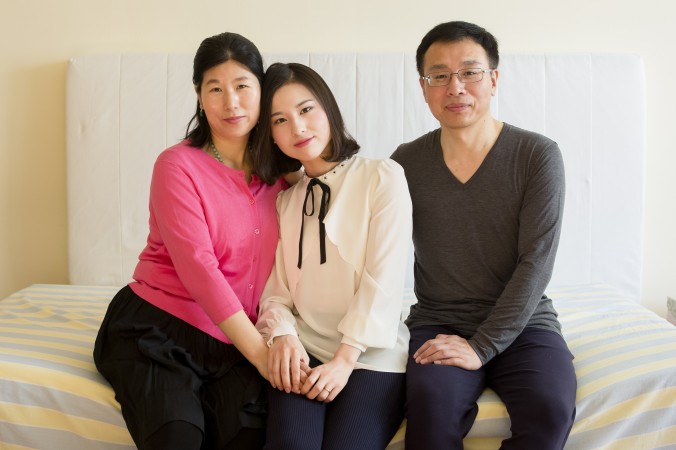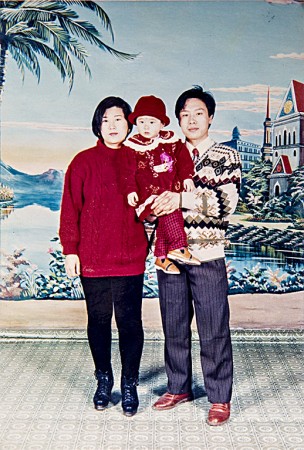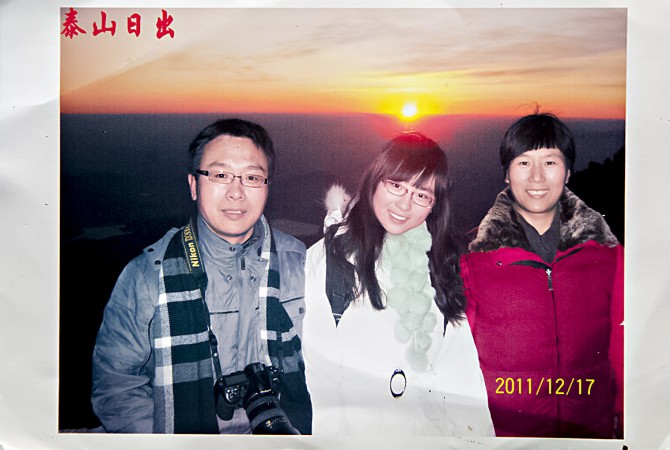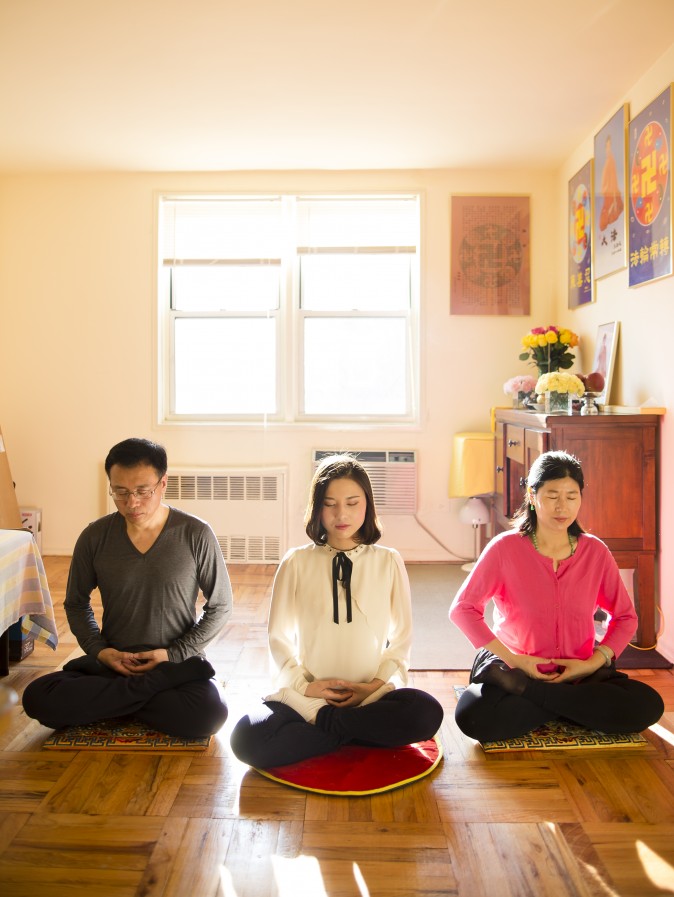
Life After Torture
A family seeks normalcy after enduring a decade of extraordinary persecution in China
NEW YORK—She had been interrogated before, but this time was worse. Wang Huijuan, an elementary school teacher, was a prize catch, and the guard at the train station was going to get a handsome reward for turning her in.
He had excitedly radioed the domestic security police, “We found another one who practices Falun Gong!” recalled Wang. In a flash, several officers appeared and hurriedly removed everyone from the station’s waiting area before transporting Wang to a local detention center.
The guard had searched Wang’s luggage and found fliers and DVDs explaining the Chinese regime’s persecution of Falun Gong (also called Falun Dafa) and exposing the state’s propaganda campaign to vilify the spiritual practice. The police demanded to know who she got them from and where they were being produced.
At the detention center, she was struggling so much the officers were unable to tie her up. So they rammed her head against a wall and started whipping her head and face with a metal ruler from a nearby office desk.
“There was lots of blood. My nose and mouth were bleeding, and they shattered my eardrums,” said Wang, who now lives in New York (and wears hearing aids).
“I thought one thing then: ‘Even if I die, I won’t give up the others’ names,’” she recalled through a translator. “And I won’t renounce my faith.”
But the cost was high.
She spent the next seven years in prison, separated from her husband and young daughter. Wang endured brainwashing, interrogation, physical restraint, beatings, force-feedings, sleep deprivation, and psychological torture.
“They connected everything to ‘transforming’—which meant you sign a statement saying you won’t practice Falun Dafa anymore,” Wang said. “If you didn’t transform, they wouldn’t let you see family, or you would get fired, or your coworkers would get into trouble, or the police officers would be punished. They had quotas.”
And if you did sign a statement, that wasn’t the end of the psychological torture; you would be used to help transform other practitioners.

Persecution Launched
Wang and her husband Li were in and out of forced labor camps, brainwashing centers, and prisons consistently over a 10-year period, simply because they refused to renounce their belief in Falun Gong.
When the couple first started practicing in 1998, the Chinese regime was supportive of Falun Gong, which is based on the tenets of truthfulness, compassion, and tolerance. According to the regime’s own estimates, more than 70 million citizens were practicing, and the state department of sports reported widespread improvements in health and morality. Parks were overflowing with people doing the exercises and meditation in the mornings.
But communism advocates atheism, and the sheer number of Falun Gong adherents scared the Communist Party chief at the time, Jiang Zemin.
On July 20, 1999, Jiang began a nationwide campaign of persecution with the mission of “destroying the reputation of Falun Gong completely, exhausting Falun Gong practitioners financially, and eradicating Falun Gong within three months,” according to the Falun Dafa Information Center, a New York-based NGO that tracks the persecution.
Jiang created an extra-judicial police force called the 610 Office with the express mandate to carry out his plan. And every factory, school, and state workplace already had an embedded official whose job is to ensure the whole population toes the Party line.
Amnesty International said the persecution was politically motivated. “And the vast majority of its victims are ordinary people who merely exercised peacefully their fundamental rights to freedom of belief, association, and expression,” according to a March 2000 statement.
A Childhood Stolen
Fuyao was only 6 years old when her parents disappeared into China’s forced labor camp system for the first time.
“I was confused, I didn’t understand what happened,” said Fuyao, now 24 and living in New York. “But I knew my parents were right, because they were standing up for what they believed in.”
The little girl’s resolve was tested on every level. Her classmates shunned her and spat in her books at primary school while the teachers looked on; her parents were barely around; and her only constant was her grandmother, who was sick with worry about her son and daughter-in-law.
But neither anger nor resentment is detectable in her demeanor. She said she knew all along her parents had committed no crimes.
“I have huge respect for what they did and what they endured,” Fuyao said.
Wang said her heart still hurts when she thinks about the separation from her daughter. “After I was taken, I was most worried about my daughter—she’s so young, how will she face all this?”
Wang recalled that one time when Fuyao visited, Wang asked her, “Would you rather I transform and come home, or maintain my faith and not go against my conscience? If I tell the truth, they will keep me here.”
Wang said, “I was crying and she wiped my tears and said, ‘Mommy, you have to be righteous. You can’t say Falun Dafa is bad.’”
Forced to Choose
The first time he traveled from his hometown Tianjin to protest the persecution, Fuyao’s father, Li, was torn. It was October 1999 and Tiananmen Square had become the main place to protest because of its proximity to the government compound—and because of the memories it still held from the 1989 student massacre.
“I was hugging my daughter in the morning, crying, thinking it could be the last time I ever saw her,” said Li, who was a successful television anchor.
He knew the risks of peaceful protest—since July 1999, tens of thousands of Falun Gong adherents had been arrested and thrown into forced labor camps and brainwashing centers. He had heard horrific stories of torture and death.
If I don’t speak out for [Falun Gong], who will? But I went to Tiananmen Square thinking I would probably be killed.
But he had also experienced his own miracle with the practice. He had chronic hepatitis B, and by July 1998 was told it was incurable. He started to practice the Falun Gong exercises and learn the teachings, and over a few weeks, Li said, his body became strong and healthy. That was nearly 18 years ago.
That’s what made his decision to go to Tiananmen Square easier. “Falun Dafa had given me a second chance and it should be practiced freely in China,” Li said. “If I don’t speak out for it, who will? But I went to Tiananmen Square thinking I would probably be killed.”
He was arrested almost as soon as he stepped foot in the square, and several days later Li was sentenced to three years in a forced labor camp. There was no judge and no jury, just a police officer reading the sentence off a piece of paper. Li had committed no crimes, no charges were explained, and there was no way to appeal. He was about to be illegally detained for years simply because he practiced Falun Gong.
“I was a good citizen. This didn’t make any sense,” he said.

His head was shaved, he was given his navy blue prison garb, and he was assigned a top bunk in a tiny room with six bunk beds. There were no mattresses; the prisoners slept directly on the wooden slats and only had a blanket if their family sent one.
“Because it was dark and damp, most people developed scabies or welts,” Li said. “At night, you could casually wipe the slats with your hand and kill multiple bedbugs.”
Every morning they had to remove their blankets and then perfectly make their beds with some snow-white sheets and green blankets the guards provided. It was forbidden to sit or lie on these covers—they were purely for show, in case government officials visited.
The food was horrendous.
“The vegetables were rotten. They just threw them, unwashed, into a pot and boiled them,” he said. “The rice gruel was mixed with tap water and hardly contained any rice.” To this day, Li cannot face eating eggplant or carrots.
He was given five steamed buns a day, which often contained rat feces. “The ones in the morning and at night were blackened. The ones at lunch were slightly whiter,” he recalled.
Li spent 16 hours a day, seven days a week for more than two years, stitching together commemorative soccer balls for the 2002 FIFA World Cup—all while imprisoned in squalor, unpaid, starving, and tortured.
He had to complete four balls a day, no matter what. The balls required about 1,800 stitches each, and they had 32 panels made up of 20 hexagonal and 12 pentagonal patches. His fingers were often infected and seeped blood and pus from the toxins in the fake leather, especially if he accidentally stabbed himself with the needle.
“We worked from 6 a.m. to at least 10 p.m.,” Li said. “I was considered someone who worked relatively quickly; people who didn’t finish were beaten.”
Beatings were often carried out by other inmates (usually the meanest, said Li) who were keen to curry favor with the guards. In Li’s case, it was a prisoner convicted for enslaving a person in his home for years.
Every night after work, for two hours, Li and the other Falun Gong practitioners were forced to sit hunched over on small stools looking at the floor. If they so much as glanced at each other, they were beaten.
He was told he would be exempt from these “study” sessions if he wrote a statement saying he would stop practicing Falun Gong. Several months into his detainment, exhausted and feeling hopeless, he did.
“But I felt awful,” Li said. “Before I wrote it, it was physical torture; after I wrote it, it was moral, psychological torture.”
Not long after, he recanted his statement and asked a police officer to give the paper back. The police refused, and he was given extra punishment. But the psychological burden was lifted.
Fuyao only saw her father twice a year. Separated by glass and talking through a phone, she would encourage him to keep going.
“Fuyao often wrote letters to me, saying, ‘You have to stick to your values,’” Li said.
Li was released after his initial term, but 18 months later, he was arrested again and imprisoned for four years.
Effects on a Nation
The number of families directly impacted by the persecution in China is hard to overestimate, said Levi Browde, spokesperson for the Falun Dafa Information Center.
In 1999 when the persecution started, with 70 million to 100 million people practicing, it meant one out of every 13 people became an “enemy of the state,” Browde said via email.
“If you take one-thirteenth of the entire population, vilify them and turn their families against them, what kind of impact does that have? It’s catastrophic,” he said.
It is a common technique for the Chinese regime to force family members to turn against each other, said Browde. It ensures the ultimate goal of control over people, through fear, and it was perfected during the Cultural Revolution in the ’60s and ’70s.
“In a way, the persecution of Falun Gong is just the latest spasm of the Communist Party’s (CCP) effort to commandeer the hearts and minds of the people,” Browde said.
He offered an explanation as to why parents choose to continue practicing Falun Gong when they could just stop and keep their families together.
“Falun Gong is fundamental to who they are spiritually, so you’re asking them to kill their spirits. Also, they are not completely left alone if they ‘renounce.’ Frequently, they have to join the CCP in ‘converting’ others … so it goes beyond giving up who they are.”
After Prison
The family was finally reunited in 2009, after Wang was released; Li had been out since November 2006, and Fuyao was now 14.
Wang couldn’t go back to her job as a school teacher and Li had been forced out of his news anchor position the first time he was arrested.
They started a wedding planning business and the shop doubled as a place for them to tell people their stories of persecution and to counteract the state’s anti-Falun Gong propaganda, which everyone in China had seen on state media.
“The only reason we didn’t get sent back to jail was because the local Domestic Security Bureau head was an old family friend and he knew my husband and I were kind,” Wang said. “He protected us, but his superiors continuously put enormous pressure on him to persecute us.”
Wang said the decision to get out of China was partly because they were worried about their friend being compromised, as well as their family’s safety.
“Always in my heart, there is a fear of my family being broken up again. We were always worried the police would come knocking; worried about other family members getting arrested; worried about our daughter getting arrested,” she said.

Reaching Freedom
In 2014, they saw a chance to escape and seek asylum in America.
The biggest heart-stopping moment came when they were in the passport office applying. In one of the final steps, they gave their fingerprints, which were entered into the computer.
“The officials froze and looked at each other,” Li said. “Then the official made a phone call and whoever was on the other end told them to grant our passports.”
They arrived in America on July 15, 2014.
“When we got on U.S. soil, all of our fears evaporated; our worries and anxiety were gone. We were finally at peace,” Wang said.
As I breathe the fresh air and enjoy my rights and freedom of belief here, I can’t help but have a heavy heart for my fellow citizens in China.

“But the psychological trauma is very hard to erase,” she said. “And as I breathe the fresh air and enjoy my rights and freedom of belief here, I can’t help but have a heavy heart for my fellow citizens in China.”
The family heard news that 20 Falun Gong practitioners were arrested in their hometown, Tianjin, on Dec. 7, 2016.
Wang said she immediately called the local detention centers to pressure officials to release them.
“I know a few of the practitioners. I want to do what I can to help rescue them so they don’t endure what I suffered,” she said.
In New York, she spends as much time as possible at popular tourist sites to hand out information about the persecution to visitors from mainland China.
Li, now 45, works at NTD Television, which broadcasts uncensored news and programs about China across the world and into the mainland via satellite (and is a sister media of the Epoch Times). It’s a perfect fit for him.
Fuyao followed in her father’s footsteps by learning broadcasting and narration. She joined him at NTD and is now a news anchor.
“Whenever I work on news stories about the persecution of Falun Gong in China, the images are heart-wrenching to look at; they bring up so many painful memories for me,” Fuyao said. “But it is precisely because these horrible things are happening that we have a responsibility to expose them.”
She married last year, and the four of them live in a humble apartment in Queens, New York. It’s a happy home and the family is close. Wang brushes Fuyao’s hair out of her eyes; Li and Wang briefly hold hands; they still gaze at each other as if they can’t believe it’s real.

But, the painful memories are never far away.
Wang tries to explain: “Sometimes when I’m alone thinking about my experiences in jail, I know that if I didn’t practice Falun Dafa, I couldn’t have survived. That pain, it’s not just physical, it’s a different kind of pain.
“You aren’t a bad person, you want to develop into an even better person, but the regime uses the most barbaric, evil ways—what good people cannot even imagine—to these Falun Gong practitioners, to their psyche, to try to destroy you from the very bottom; not physically, but psychologically drive you crazy so you have no hope of living.”
A Falun Gong practitioner dies in police custody every three days, according to the Falun Dafa Information Center—and that’s only accounting for the verified cases.
By Charlotte Cuthbertson, Epoch Times
Irene Luo contributed to this report.
—
Communism is estimated to have killed at least 100 million people, yet its crimes have not been compiled and its ideology still persists. Epoch Times seeks to expose the history and beliefs of this movement, which has been a source of tyranny and destruction since it emerged.
Source
The Epoch Times | Life After Torture


